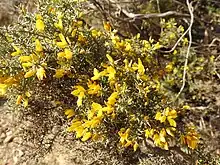| Ulex argenteus | |
|---|---|
 | |
| Ulex argenteus in flower in Castro Marim, Portugal | |
| Scientific classification | |
| Kingdom: | Plantae |
| Clade: | Tracheophytes |
| Clade: | Angiosperms |
| Clade: | Eudicots |
| Clade: | Rosids |
| Order: | Fabales |
| Family: | Fabaceae |
| Subfamily: | Faboideae |
| Genus: | Ulex |
| Species: | U. argenteus |
| Binomial name | |
| Ulex argenteus Webb | |
Ulex argenteus is a species of gorse native to southern Portugal (Algarve and Alentejo) in the Iberian Peninsula.
Description
Ulex argenteus is a low-growing shrub with an open branching structure. Branches, stems, and spines are densely covered in short erect hairs, which give the species a silvery colour. Spines are thin and straight or sometimes slightly arched. The calyx is typically 7.5 to 8.5 mm long. [2]
Taxonomy and systematics
Ulex argenteus is a diploid species.[3] Ulex canescens (diploid), and Ulex erinaceus and Ulex subsericeus (both polyploid) have been included in Ulex argenteus in the past, as subspecies or synonyms.[2][4] However, phylogenetic evidence suggests they are not closely related to U. argenteus.[3] [5]
Distribution and habitat
The species is distributed in southern Portugal, growing in both metamorphic and calcareous hills.[2][5]
Conservation
The species has a narrow distribution range but remains common in suitable habitat. As a result, it has been assessed as Least Concern.[1]
References
- 1 2 Buira, A., Carapeto, A., García Murillo, P.G. & Monteiro-Henriques, T. (2016). "Ulex argenteus". IUCN Red List of Threatened Species. 2016: e.T83827824A86136466. doi:10.2305/IUCN.UK.2017-3.RLTS.T83827824A86136466.en. Retrieved 12 March 2022.
{{cite journal}}: CS1 maint: multiple names: authors list (link) - 1 2 3 Cubas, P. (1999). "Ulex L.". In Castroviejo, S. (ed.). Flora ibérica: plantas vasculares de la Península Ibérica e Islas Baleares: Vol. VII, 1, Leguminosae (Partim). Real Jardín Botánico, CSIC. pp. 212–239. ISBN 84-00-07821-7.
- 1 2 Ainouche, Abdelkader; Bayer, Randall J.; Cubas, Paloma; Misset, Marie-Thérèse (2003). "Phylogenetic relationships within tribe Genisteae (Papilionoideae) with special reference to genus Ulex". In Klitgaard, B.B.; Bruneau, A. (eds.). Advances in Legume Systematics part 10, Higher Level Systematics. Royal Botanic Gardens, Kew. pp. 239–252.
- ↑ Webb, D.A. (1967). "Some Taxonomic Notes on Ulex sensu lato". Feddes Repertorium. 74 (1–2): 4–6.
- 1 2 Fonseca, J.P.; Pereira, A.; Robalo, J.I.; Neto, C.; Costa, J.C. (20 January 2021). "Ribosomal DNA revealed an extensive role of allopolyploidy in the radiation of Ulex L.". bioRxiv 10.1101/2021.01.20.427424.
